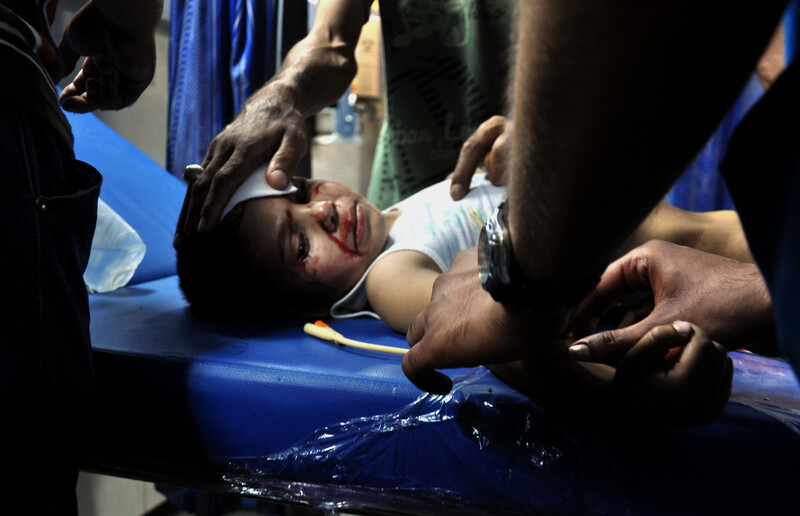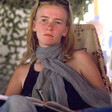The Electronic Intifada 31 January 2017

Israel argues that its army is not accountable to any victim of its violence in Gaza because they are residents of an “enemy territory.”
APA imagesOn his 15th birthday, Atiya Nabahin was shot in the neck by Israeli soldiers while he was on his way home from school. That was in November 2014, less than three months into the ceasefire that ended Israel’s bombing campaign against Gaza during the summer of that year.
At the time Atiya was shot, there were no so-called “clashes” occurring at the boundary between Gaza and present-day Israel. The Israeli soldiers opened fire across the boundary at the young teen.
After spending six months at an Israeli hospital, at the expense of the Palestinian Authority, doctors admitted Atiya was permanently paralyzed in all four of his limbs. He would be dependent on others for the rest of his life.
Now his family is seeking damages from the Israeli army.
They believe the army should compensate the family for the burdensome costs they now face to care for Atiya.
In 2014, the Israeli army tried to justify the shooting, saying the boy was in a prohibited area.
But, in response to the family’s lawsuit, the state is now arguing that the army is not accountable to any victim of its violence in Gaza because they are residents of an “enemy territory.”
Sweeping impunity
Ofer Shoval, deputy district attorney in Tel Aviv, has asked a judge to reject the suit, arguing that Israeli law “explicitly states that the state is not responsible for damages in these circumstances.”
Shoval is correct. But the two human rights groups representing Atiya’s family – Adalah in Haifa and Al Mezan in Gaza – hope to challenge the laws granting impunity to Israeli soldiers.
In 2012, Israel amended its Civil Wrongs Law to grant sweeping impunity to the army, specifically when injury is inflicted on residents from an area that the Israeli government has declared an “enemy territory.”
In October 2014, Prime Minister Benjamin Netanyahu issued an order declaring the Gaza Strip as enemy territory. Netanyahu specified that the order would apply retroactively, beginning on 7 July that year – just before Israel launched its major offensive on Gaza.
According to Jamil Dakwar, a former senior attorney with Adalah, the Israeli government has long been trying to limit the ability for Palestinians to sue for damages. In 1998, the Israeli high court ruled that the state could be sued under the Civil Wrongs Law when the victim was injured while the Israeli army was “policing” the area, as opposed to conducting “wartime activity.”
“So the Israeli government panicked and rushed to amend the law so that it would provide them with more latitude of immunity from such lawsuits,” Dakwar explained to The Electronic Intifada.
Since the 1998 ruling, Israel’s parliament, the Knesset, has approved a number of amendments to the Civil Wrongs Law. They broadened Israel’s protection against civil suits from Palestinians in order to undermine the high court decision, which Dakwar notes was itself “narrow and did not fully recognize rights of Palestinians to seek meaningful remedy.”
“Given Israel’s continuing military attacks on Palestinian civilian areas,” Dakwar said, noting the rising violence against Palestinians during the second intifada, “there was a need to provide a carte blanche shield for the Israeli military to act with impunity.”
In 2006, after nine human rights groups petitioned against the amendments, the Israeli high court partially struck them down. The court ruled against the government, writing the amendments had the “improper aim of exempting the state from all responsibility for damages in conflict zones … in relation to wide categories of actions that are not combat actions even in the broadest definition of that term.”
But in 2012, the government passed an amendment granting the army even more sweeping impunity.
Atiya Nabahin’s lawsuit is the first attempt to challenge the law in court. It will be heard by an Israeli district court in Bir al-Saba (Beer Sheva).
Expanding the war zone
Ever since the state was established, Israel has claimed immunity from all civil claims against incidents that were a result of “wartime activity.” But because Israel conducts violence in the course of its daily policing, patrolling and occupation of Palestinians, it has had to expand its definition of “wartime activity.”
While Israel’s high court has ruled that Palestinians can in principle seek remedy from the Israeli army, numerous legal caveats have made it all but impossible to do so.
Israel has also imposed numerous obstacles to discourage Palestinians from going to court. Israel requires Palestinians to deposit thousands of dollars to file a civil claim, limits their ability to travel to appear in court as plaintiffs or witnesses and has shortened the statute of limitations, according to Dakwar.
Furthermore, the court has repeatedly assisted the government in broadening the scope of its “war.”
In 2002, Israel’s high court ruled that “wartime activity” includes any conduct directed against “terrorist organizations.”
In 2015, the high court threw out a civil claim made by the family of Rachel Corrie, an American activist who was crushed to death by an army bulldozer in 2003 while she was standing in front of a Palestinian home targeted for demolition. While dismissing the Corrie case, the court upheld this broad definition of war.
“Indeed, modern warfare is changing face,” the high court ruling states. “To a large extent, it no longer entails a war waged by the army of one state against the army of another state, but rather a war, sometimes a daily one, against new threats that we did not know in the past.”
Dakwar, who worked on the Rachel Corrie case, is realistic about the lawsuit filed by Atiya Nabahin’s family.
“If this case is dismissed, it will not be surprising,” he said. “It will just be consistent with a pattern where the Israeli judicial system has become another arm of the occupation, approving the worst policies of the Israeli military since 1967.”
Charlotte Silver is an associate editor of The Electronic Intifada.





